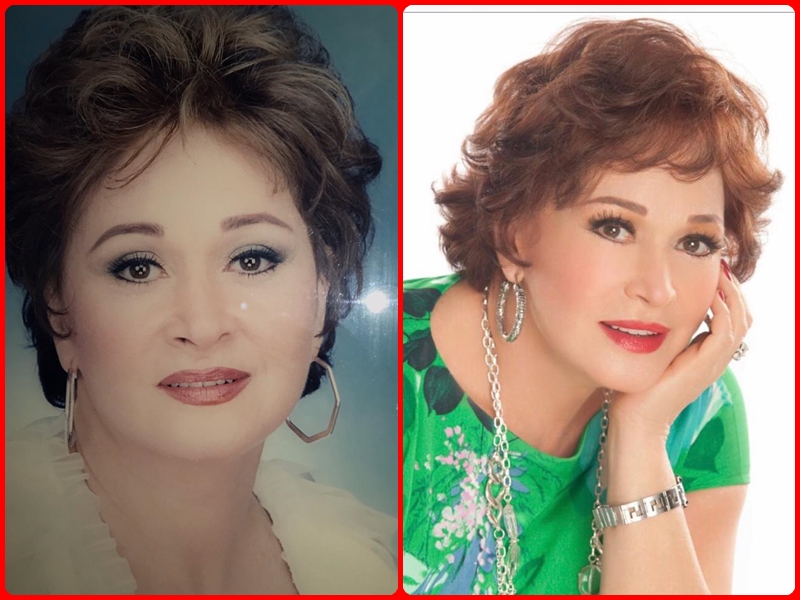The award celebrates Lebleba’s extensive career that kick started at the tender age of five as an acting prodigy who was best known for her celebrity imitations. Her robust repertoire encompasses more than 200 songs, and over 60 films, TV drama hits, and plays.
Hussein Fahmy, President of Cairo International Film Festival, commented, stating: “We are proud to present CIFF’s Lifetime Achievement Award to the iconic star, Lebleba, who has devotedly contributed to the Egyptian cinema and TV drama as one of the most recognizable Egyptian celebrities throughout her career. Since the early years of her professional journey, Lebleba dedicated her life to the filmmaking industry through her versatile work. Personally, I am honored that I have been part of her long-standing career where I starred alongside her in several films.”
Amir Ramses, Director of Cairo International Film Festival, also added: “Lebleba is a valuable asset to any film director, as her spontaneity, charisma, and unrivaled ability to switch from comedies to heart-wrenching dramas has given depth to her roles in any films, which strongly attracted massive audiences across the Arab world throughout the years.”
Lebleba expressed her delight to receive the award, saying: “I have been previously honored in different regional and international film festivals, yet I find it very special to receive the honorary Lifetime Achievement Award from Cairo International Film Festival. This award is every Egyptian actor’s dream and I am delighted to stand on the festival’s stage as one of its honorees.”
Ninochka Manoug Kupelian, better known by her stage name “Lebleba”, is an Egyptian film actress, singer and entertainer of Armenian descent, belonging to the same artistic family featuring the iconic stars; Fayrouz who has been dubbed “The Miracle Child” during the “Golden Era” of cinema, and her sister, the legendary actress and entertainer Nelly who received CIFF’s Lifetime Achievement Award during the festival’s 43rd edition last year.
At the age of five, Lebleba started her career as a burgeoning talent, starring in several films, during the 1950s, including: “Habibty Sousou” (1951) by director Neyazi Moustafa, “El Beit El Saeed” (1952) by Hussein Sedki, “Ya Zalemni” (1954) by director Ibrahim Emara, and “Arba’a Banat w Dabet” (1954) written,directed and starred by Anwar Wagdy. Lebleba did not only star in the film alongside the salient stars Anwar Wagdy and Na’eema Akef, together with Ragaa’a Youssef, and Awatef Youssef, but also she was featured on the film’s official poster. Likewise, in 1955 Lebleba starred in “Al Habeeb Al Maghoul” by director Hussein El Seifi, with whom she collaborated in the films “Al Nagham Al Hazeen” (1960), and “Kadi El Gharam” (1962).
During the 1960s-70s, as Lebleba has been growing into a burgeoning talent during her teenage years, taking part in different films, namely; “Nemr El Talameza” (1964) by Eissa Karama, “Egaza Bel’afeya” by Nagdy Hafez, and “Akher El Ankoud” by Zuhair Bekeer (1966). She collaborated one more time with director Hassan El Seifi in “Shantet Hamza” (1967), “El Meliouneer El Mozayaf” (1968), “Borg El Azraa” (1970) by director Mahmoud Zoulfaqar, “Rehlet Shahr El Asssal” by director Zuhair Bekeer, “Bent Badee’a” by Hassan El Emam, and “Zawag bel Ekraah” by Nagdy Hafez (1972).
Lebleba went on to present more iconic films in 1973; “El Shayateen Fi Agaza” by Hossam Eldin Moustafa, “Shee’e Men El Hob” by director Ahmed Fouad, “El Sokareya” by Hassan El Emam, which is based on the Nobel laureate Naguib Mahfouz’s award-winning novel, marking one of the Egyptian Cinema’s key films.
In 1974, Lebleba presented 6 films, namely: “El Banat Wel Hob” by Hossam El Din Moustafa, “24 Sa’aa Hob” by Ahmed Fouad, “Arees El Hana” by Mahmoud Fareed, “Fel Seif Lazem Neheb” by Mohamed Abdelaziz, and two films by Hassan El Emam: “Agayeb Ya Zaman”, and “Hekayti Ma’a El Zaman” that was headlined by the great Roshdy Abaza and Warda.
In 1975, during the 1970s, Lebleba starred in other films, including: “Mouled ya Donia”, by director Hussein Kamal, “Ehtaresi Men Al Regal Ya Mama” by Mahmoud Fareed, “Meen Ye2dar Ala Aziza” by director Ahmed Fouad, where she first starred alongside the salient Hussein Fahmy, who later collaborated with her in “Alf Bousa W Bousa” (1977) by director Mohamed Abdelaziz, “Hob Fawk El Borkan” (1978) by Hassan Emam, and “Shaytan Men Assal” by Hassan El Seifi in 1985.
Throughout her career, Lebleba starred alongside several iconic stars, forming some of the Egyptian cinema’s most indelible and charismatic duos during the 1970s-80s. The most remarkable of these include her duo alongside the comedy legend Adel Imam in the blockbuster films: “Al Baad Yzhab Lel Ma’zoun Martein” (1978), “Khali Balak Men Geranak” (1979), and “Esabet Hamada w Toutou” (1982), all directed by Mohamed Abdelaziz, as well as “Ehtares Men Al Kkhot” (1984) by Samir Seif.
Likewise, another adorable duo featuring Lebleba was presented alongside the comedy guru Samir Ghanem in the films: “Enahom Yasreqoun El Araneb” (1983) by director Nader Galal, “Ehna Betou’ El Es’eaf” (1984) by director Salah Karim, and “Mahatet El Ense” (1985) by director Hassan Ibrahim, to name a few.
She also presented further charismatic on-screen collaborations with several stars in the same period; including: the great Mohamed Sobhy in “Al Shaytana Alti Ahabatni” (1990) by director Samir Seif, the salient Ahmed Zaki in “Ded El Hokouma” (1992) by director Atef El Tayeb, and the legendary Nour El Shareef in “Leila Sakhena” (1995) by director Atef El Tayeb that won her the Arab Film Biennale Award "Biennale des Cinémas Arabes" of the Arab World Institute (Institut du Monde Arabe - IMA).
In 1999, Lebleba marked further milestones in her career with the films: “Ganet El Shayateen” by director Osama Fawzy, starring alongside Mahmoud Hemeida, “Al Akhar” by Youssef Shahin, with whom she had another collaboration in “Eskendria Newyork” in 2004.
In 2000s, Lebleba took part in several remarkable films, including: “Ma’ali Al Wazeer” (2002) by director Samir Seif, opposite Ahmed Zaki, and “Al Na’aama Wal Tawous” (2002) by director Salah Abou Seif.
In 2004, she presented more iconic collaborations with Adel Imam in “Arees Men Geha Amnia” by director Ali Edris, and “Hassan w Morkos” (2008) by director Rami Emam, that also featured the international star Omar Sharif alongside an A-list cast of Egyptian stars.
Her list of most notable films include “Farhan Melazem Adam” (2005) by director Omar AbdelAziz, where she presented an exquisite performance as “Ehsan” opposite Sami El Adl, Hassan Hosny, and Fathi Abdelwahab.
Furthermore, Lebleba starred alongside young film stars including Mohamed Heneidy in “Wesh Egram” (2006) by director Wael Ehsan, Mohamed Saad in “Bouha” (2005) by director Rami Emam, Mohamed Emam in “El Beih Romansy” (2009) by director Ahmed El Badri, Hassan El Radad and Houreya Farghaly in “Nazareyet Ameti” (2013) by Akram Fareed, and Kareem Abdelaziz in “Blue Elephant” (2014) by director Marwan Hamed, and most recently she starred in the film “Casablanca” (2019), which marks her latest cinematic work.
Lebleba landed her debut in TV drama hits starring opposite Adel Imam in “Saheb El Saada” (2014) by director Rami Emam, which was followed by “Ma’moun wa Shorakah” (2016), “El Share’q Elly Warana” (2018) by director Magdy El Hawary, and “Dayman Amer” that premiered in Ramadan 2022.
Throughout her career journey, Lebleba presented several monologue performances, where she was best known for her exquisite talent in imitating public figures and celebrities.
On the other hand, Lebleba took part as a festival jury member in several international film festivals and events, including Cairo International Film Festival.
Cairo International Film Festival is one of the oldest and most attended festivals in the Arab world and Africa. Furthermore, the International Federation of Film Producers Associations (FIAPF) in Paris has accredited it as an “A” category festival, marking it the only one in the Arab and African region on the list.
CIFF Honors Lebleba with the Lifetime Achievement Award
- Details
- By Super User Super User
- Hits: 1261
Cairo –August, Rim Chaker:-
Cairo International Film Festival (CIFF) will honor the legendary star Lebleba with the prestigious Lifetime Achievement Award during the 44th edition (13 – 22 November).

Joomla! Pages
Other Pages
J!Content
Subscribe
Copyright © 2026 economielights. All Rights Reserved.
Joomla! is Free Software released under the GNU General Public License.


